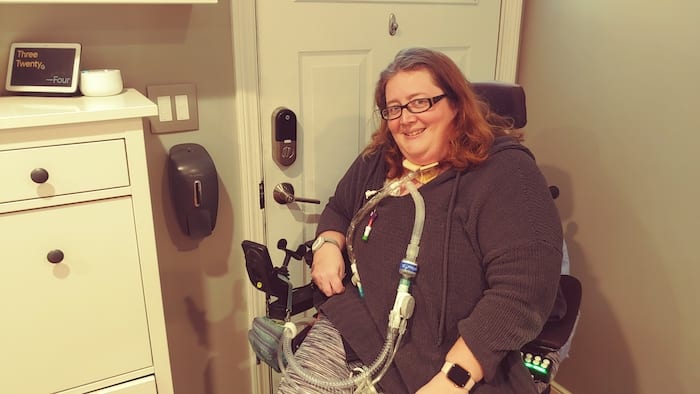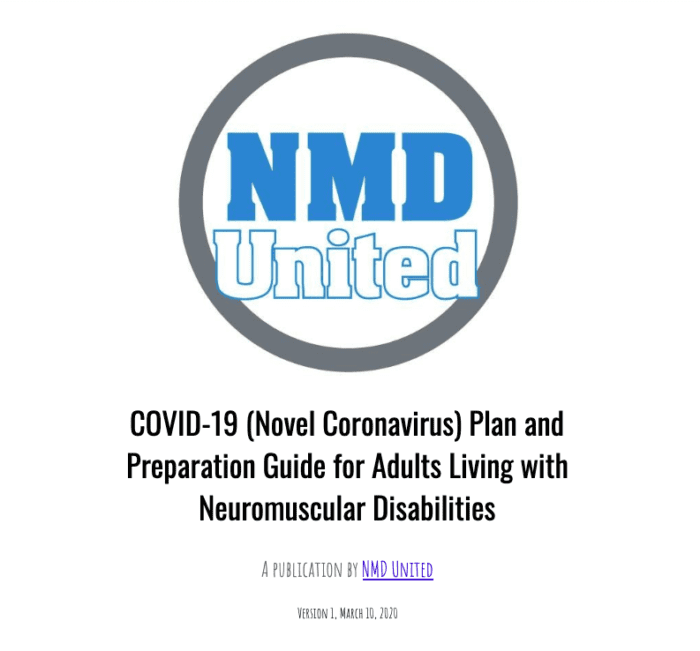
“Now, what’s happening is that everybody’s panic to buy supplies is interrupting the system I have. I need rubbing alcohol. Hand sanitizer is getting more and more difficult to access, and the supplies to make it are also selling out of stores.”
Crystal Evans regularly uses about one-hundred medical supplies, give or take. She also tirelessly advocates for others, so I thought that she would be a helpful person to connect with for information about people with certain disabilities, where they may find help during the COVID-19 crisis, and what their neighbors can do to help those with limited mobility.
Evans has run into serious problems on the supply side before, like when a production chain for one product was compromised, knocking it off the market. Having learned from past experiences, she is stocked and prepared for the coronavirus threat, which Evans recognizes has the potential to get increasingly messy.
When I contacted her on Friday morning, she was on a mini-tour of big box stores and shopping centers, sharing pics on social media to help guide friends and followers toward toilet paper and other essentials in her area.
“Walgreens is bare right now,” she said, “but I found out that they’re getting a big shipment in [Saturday] morning.”
It’s no surprise that Evans is selflessly helping in a time like this. In normal times, she’s busy strategizing as an activist in Greater Boston and on the South Shore, giving a voice to countless people with a range of disabilities. Regarding coronavirus, Evans noted the group she works with, NMD [Neuromuscular Disease] United, which represents a number of people who, like her, use ventilators tracheostomy tubes. Earlier this week, the international organization released “a COVID-19 guide for adults living with neuromuscular disabilities … to provide fact-based, reliable resources that educate our community on how to reduce and prevent the spread of COVID-19, while also providing practical coping tools and life-management strategies that can be used not just for this specific situation, but for addressing any viral or bacterial infection risk.”
“We have fluid discussions going on,” Evans said, “specifically about the needs of people with complex medical conditions, because our needs are going to be different from what you generally see put out there.”
One major concern: the health of personal care assistants, or PCAs. Evans has a standard screening process: “You can ask if they have been travelling to another country, if they’ve had any contact with anyone near the coronavirus, or if anyone around them has been sick. These are questions for before anyone enters the home.”
If anybody’s prepared for the current calamity, it’s Evans.
“The level of extreme that everybody else in the world is going to to clean, is how I live my life,” she said. “I keep hand sanitizer on the wall next to my door for the nurses who are doing IV care with the same clothes they’ve been wearing patient to patient. I have my house laid out in an infection control manner; when the nurse comes in, everything she needs is by the door, and my PCAs walk the house and stock it daily.”
She continued, “Now, what’s happening is that everybody’s panic to buy supplies is interrupting the system I have. I need rubbing alcohol—I can easily go through 20 [wipes] in a day for central line use, and if you don’t clean the line that’s how you get sepsis—and things like that are dwindling. Hand sanitizer is getting more and more difficult to access, and the supplies to make it are also selling out of stores.”
Even with all that preparedness, some potential upcoming scenarios seem dire.
“A lot of people are self-quarantining just for their own protection at this point,” Evans said. “Others are trying to figure out how to maintain care. One of my main concerns is if they start quarantining areas, we could lose access to home healthcare workers.”
Through the fog, Evans sees some silver lining for a person in her position. “I do have some advantages, because I’m on a ventilator and I’m in a power wheelchair,” she said, speaking about whether she will ride the T in the coming days. “The doors open automatically for everybody, and I’m sitting in my own chair. I have no reason to be actually touching anything that’s on the T. Able-bodied ambulatory people would be using the seats, grabbing the poles. I don’t have any reason to touch things, and to my advantage I am on a ventilator, so I pull air from the vent on my chair.”
Though Evans has a helpful network and is capable of commuting on her own, for those who aren’t as mobile she recommends the Neighbor Brigade network for advice and assistance. As for the able-bodied people among us, she asks that you consider those around you who may need a hand.
“We need people to realize that we are out here,” Evans said. “I am very active, but a lot of people are more shut in. Some are less able to come and go from their house for various reasons, and a lot of them probably don’t want to leave their house because it may compromise their immune system.
“Everything is going to be quickly changing. And in addition to this, it’s flu season too.”
A Queens, NY native who came to New England in 2004 to earn his MA in journalism at Boston University, Chris Faraone is the editor and co-publisher of DigBoston and a co-founder of the Boston Institute for Nonprofit Journalism. He has published several books including 99 Nights with the 99 Percent, and has written liner notes for hip-hop gods including Cypress Hill, Pete Rock, Nas, and various members of the Wu-Tang Clan.


